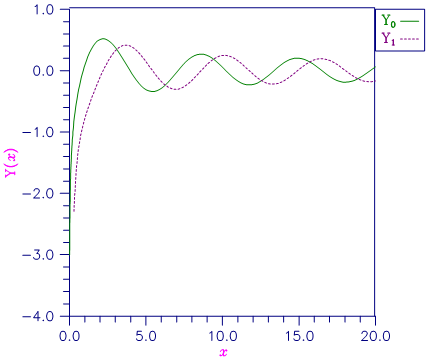besselY0¶
Evaluates the real Bessel function of the second kind of order zero \(Y_0(x)\).
Synopsis¶
besselY0 (x)
Required Arguments¶
- float
x(Input) - Point at which the Bessel function is to be evaluated.
Return Value¶
The value of the Bessel function
\[Y_0(x) = \tfrac{1}{\pi} \int_0^{\pi} \sin(x \sin \theta) d \theta -
\tfrac{2}{\pi} \int_0^{\infty} e^{-z \sinh \mathrm{t}} dt\]
If no solution can be computed, NaN is returned.
Description¶
This function is sometimes called the Neumann function, \(N_0(x)\), or Weber’s function.
Since \(Y_0(x)\) is complex for negative x and is undefined at
\(x=0\), besselY0 is defined only for \(x>0\). Because the Bessel
function \(Y_0(x)\) is oscillatory, its computation becomes inaccurate as
x increases.

Figure 9.17 — Plot of Y0(x) and Y1(x)
Example¶
The Bessel function \(Y_0(1.5)\) is evaluated.
from __future__ import print_function
from numpy import *
from pyimsl.math.besselY0 import besselY0
x = 1.5
ans = besselY0(x)
print("Y0(%f) = %f" % (x, ans))
Output¶
Y0(1.500000) = 0.382449
Warning Errors¶
IMSL_LARGE_ABS_ARG_WARN |
\(|x|\) should be less than \(1/\sqrt{\varepsilon}\) where ɛ is the machine precision to prevent the answer from being less accurate than half precision. |
Fatal Errors¶
IMSL_LARGE_ABS_ARG_FATAL |
\(|x|\) should be less than \(1/\varepsilon\) where ɛ is the machine precision for the answer to have any precision. |